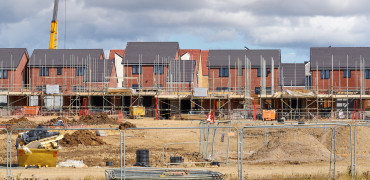Housing shortage
The number of people living in social housing in this country is in decline. As waiting lists continue to grow, more and more people are being forced into private rented housing instead. This is leaving thousands of families and vulnerable households without a suitable home. There are currently more than 1.8 million households waiting for a social home – an increase of 81% since 1997. Two thirds of households on the waiting list have been waiting for more than a year.
Many of the issues with social housing stem from the same problem; there hasn’t been enough affordable housing built over the past few decades. But despite huge lack of supply, demand for social housing has soared, exacerbating the crisis to breaking point.
In the run-up to the budget, a lot was said of the Government’s expected target to address the UK housing shortage by building 300,000 new homes next year. Whilst the clear-cut push to boost housing stock came as welcome news to the industry, it was also cautiously received and laden with caveats. We need more homes, but it is essential that if we are going to get this right from the off we need to be building the right homes in the appropriate places.
Variety is as much a problem as volume for the housing sector. Affordability and choice in the market needs to be addressed, as well as creating a greater availability of alternatives to traditional rent and homeownership options, such as shared ownership. Housing associations, alongside local councils empowered by greater borrowing freedom, can play an important role in increasing the number of affordable
The announcement alone is not enough to instill complete confidence as we stumble our way out of Europe
Getting Britain building
Policy updates included in the Budget - such as the removal of stamp duty for first-time buyers and the lifting of borrowing caps for councils in high-demand areas - were also considered as steps in the right direction.
The housing industry has long argued that if we are going to build the homes we need, councils will have to play a major part – thankfully, the budget seemed to support this. Relaxing borrowing caps for councils in high demand areas is great and will hopefully to see a return to the levels of council house building sorely needed in this country today.
£1.5bn of new money for the Home Builders Fund was cause for SME housebuilders in particular to get excited, and the commitment to provide at least £44bn capital funding, loans and guarantees to support the housing market over the next five years should result in a marked increase in construction contract opportunities. These contracts will be necessary to help support the delivery of the 300,000 new homes per year the Government is aiming to deliver by the mid-2020s, which would represent the highest level of new housebuilding seen in the UK since the 1970s.
Of course, if you've read any of my previous articles, you'll know that I am also an advocate of renewable heating, which has to remain an important element of any new housebuilding programme if the country is to meet it's legal obligations for carbon reduction - which are very stringent and approaching fast!
Preventing homelessness
With Christmas just around the corner it can be easy to keep our focus inside in the warm and forget the harsh reality that outside thousands of people are living rough on the streets or in unstable and unsuitable temporary accommodation. Homelessness is on the rise and it’s urgent that as a Nation we devise a collaborative approach to fix this crisis now.
The pressure to deal with homelessness is clearly of high importance to the Chancellor, with Housing First pilots being announced in Manchester, Liverpool and the West Midlands accompanied by a bold aim to halve homelessness by 2022 and eliminate it by 2027.
Building more homes, establishing a Homelessness Task Force, and funding programmes that help homeless people access a stable home through Help to Rent and Housing First schemes are key to supporting those in the most vulnerable circumstances. But to truly make a success of these schemes the Government must now turn these words into action – firstly by getting the Homelessness Task Force up and running to deal with the emergency of rough sleeping in this country quickly, and to fully support local councils in the roll out of the Homelessness Reduction Act when it comes into effect next year.
The measures outlined in the recent budget represent tangible progress and a real commitment to tackling homelessness. It seems the Government has recognised that to truly build a country that works for everyone, we must make tackling homelessness of the utmost priority.
In summary
Delivered against a background of Brexit and a substantial decline in growth forecasts which threatened his tenure, it’s no surprise that this was dubbed as Hammond’s ‘make-or-break’ budget. With this in mind he made housing, infrastructure and productivity the Holy Trinity designed to save his job.
The overall response from the sector seems to be that this budget is an admirable attempt to address some of the very real issues that hamper productivity and inflict pain on a society that is becoming increasingly fed up with not being heard.
However, once bitten - twice shy; the announcement alone is not enough to instill complete confidence as we stumble our way out of Europe.
Government will need to put their money where their mouth is and pull out all the stops to make things easy for the housing sector… because we have a job on our hands!
Joe Bradbury is Assistant Editor of Housing Association Magazine.
If you have any questions about this article, you can contact us via email. Or if you would like to tweet us, please follow our MEUK_LES twitter page.
We upload new articles every week so remember to check back regularly.
You can also sign up for our monthly newsletter below.




